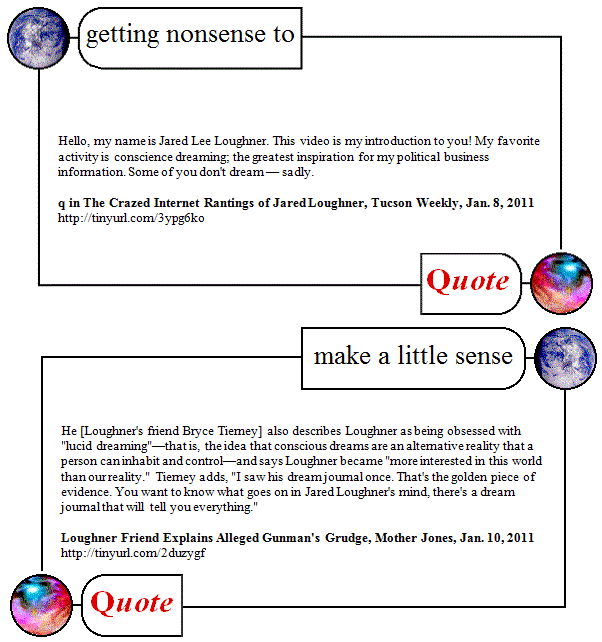Untangling two words
[ by Charles Cameron ]
I’d like to take one small data-point and bring it into sharp focus with what lit critics would call a close reading of a two-word phrase from one of Loughner’s videos.
Maybe it’s because in French conscience means both what we’d call conscience and consciousness in English, when I read the weirdly stilted prose of Jared Loughner with its curious insistence on syllogism, the phrase “conscience dreaming” suggested “conscious dreaming” to me — and I wondered whether Loughner wasn’t perhaps thinking of the activity called “lucid dreaming” in which one knows while dreaming that one is dreaming, and begins to “direct” the dream in much the same way in which a film-maker directs a film.
The first quote in this DoubleQuote is from one of Loughner’s videos — the second, which confirms my hypothesis, quotes a friend of his.
I am not suggesting that “lucid dreaming” is responsible for Loughner’s actions — I’m not sure that anything or anyone is, including Loughner himself.
My point is that here as elsewhere, figuring out what the allusions in an unfamiliar rhetoric mean is an important step in understanding the mental processes that produce it.
Lucid dreaming is one clue in the tangled mess that was Loughner’s state of mind that day…




January 18th, 2011 at 1:37 am
I recently examined that video and some others on my blog…..
.
Given his nihilism, his other statements about being a "sleepwalker" who is able to turn off the alarm clock and thus remain in the dream (so to speak) consciously — i.e., in control of his own reality — plus his general philosophy of control through grammar and currency (perpetrated by the government; btw, he often enjoins the audience to take control of or create their own currency and, I think, through his method of approaching/utilizing syllogism, their own grammar)……well it’s at the link above on my name.
January 18th, 2011 at 1:39 am
Direct link is here — http://curtisgaleweeks.typepad.com/blog/2011/01/jared-lee-loughner-despairing-nihilist.html — although often my comments here are sent into spam filter if I post a link….
January 18th, 2011 at 4:53 pm
Thanks, Curtis. You’ve put a lot of thought into this — now I need time to ponder.
January 19th, 2011 at 6:40 pm
There’s also an article on Slate looking at Nietzsche and Loughner: http://www.slate.com/id/2281133/pagenum/all/ I hadn’t read that at the time I wrote mine, but it seems others have made similar connections.
.
.
Interesting read. Nietzsche is often misunderstood, in any case, although I think it’s true that he warned about nihilism and sought a counter to it; and, however one wants to interpret Nietzsche, Loughner probably just wasn’t up to the task. It is always odd to find a nominal nihilist, or a homicidal nihilist, who can act in any way whatsoever. I.e., a rejection of inherent meaning and/or inherent truth for any given object or subject would naturally lead, to my way of thinking, to an equivocation about action. Loughner’s choice to kill others would have as much value as an alternative choice of doing nothing or sleeping in late that day, etc. Of course, then we would be considering Hamlet for a metaphor rather than, as I did on my blog, The Joker or Iago. (Incidentally, Loughner’s possible anti-government feelings may be related to Hamlet’s feelings about his uncle, given that the uncle put on a public face at variance with the truth of the situation.)